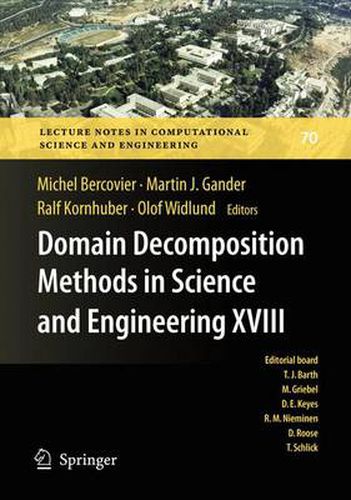Readings Newsletter
Become a Readings Member to make your shopping experience even easier.
Sign in or sign up for free!
You’re not far away from qualifying for FREE standard shipping within Australia
You’ve qualified for FREE standard shipping within Australia
The cart is loading…






This title is printed to order. This book may have been self-published. If so, we cannot guarantee the quality of the content. In the main most books will have gone through the editing process however some may not. We therefore suggest that you be aware of this before ordering this book. If in doubt check either the author or publisher’s details as we are unable to accept any returns unless they are faulty. Please contact us if you have any questions.
th This volume contains a selection of 41 refereed papers presented at the 18 International Conference of Domain Decomposition Methods hosted by the School of ComputerScience and Engineering(CSE) of the Hebrew Universityof Jerusalem, Israel, January 12-17, 2008. 1 Background of the Conference Series The International Conference on Domain Decomposition Methods has been held in twelve countries throughout Asia, Europe, the Middle East, and North America, beginning in Paris in 1987. Originally held annually, it is now spaced at roughly 18-month intervals. A complete list of past meetings appears below. The principal technical content of the conference has always been mathematical, but the principal motivation has been to make ef cient use of distributed memory computers for complex applications arising in science and engineering. The leading 15 such computers, at the petascale characterized by 10 oating point operations per second of processing power and as many Bytes of application-addressablem- ory, now marshal more than 200,000 independentprocessor cores, and systems with many millions of cores are expected soon. There is essentially no alternative to - main decomposition as a stratagem for parallelization at such scales. Contributions from mathematicians, computerscientists, engineers,and scientists are together n- essary in addressing the challenge of scale, and all are important to this conference.
$9.00 standard shipping within Australia
FREE standard shipping within Australia for orders over $100.00
Express & International shipping calculated at checkout
This title is printed to order. This book may have been self-published. If so, we cannot guarantee the quality of the content. In the main most books will have gone through the editing process however some may not. We therefore suggest that you be aware of this before ordering this book. If in doubt check either the author or publisher’s details as we are unable to accept any returns unless they are faulty. Please contact us if you have any questions.
th This volume contains a selection of 41 refereed papers presented at the 18 International Conference of Domain Decomposition Methods hosted by the School of ComputerScience and Engineering(CSE) of the Hebrew Universityof Jerusalem, Israel, January 12-17, 2008. 1 Background of the Conference Series The International Conference on Domain Decomposition Methods has been held in twelve countries throughout Asia, Europe, the Middle East, and North America, beginning in Paris in 1987. Originally held annually, it is now spaced at roughly 18-month intervals. A complete list of past meetings appears below. The principal technical content of the conference has always been mathematical, but the principal motivation has been to make ef cient use of distributed memory computers for complex applications arising in science and engineering. The leading 15 such computers, at the petascale characterized by 10 oating point operations per second of processing power and as many Bytes of application-addressablem- ory, now marshal more than 200,000 independentprocessor cores, and systems with many millions of cores are expected soon. There is essentially no alternative to - main decomposition as a stratagem for parallelization at such scales. Contributions from mathematicians, computerscientists, engineers,and scientists are together n- essary in addressing the challenge of scale, and all are important to this conference.